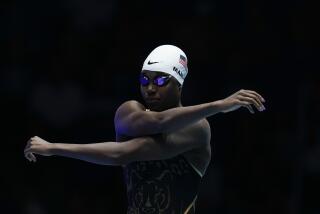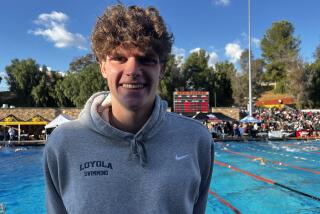SWIMMING AND DIVING / NCAA MEN’S CHAMPIONSHIPS : Host Texas Going for Fourth Consecutive Title
- Share via
AUSTIN, Tex. — Texas Coach Eddie Reese is banking on his “fast is fun” philosophy when the Longhorns attempt to win their fourth consecutive title in the NCAA Division I men’s swimming and diving championships, beginning today at the Texas Swim Center.
USC, the 1990 national runner-up, and Pacific 10 champion Stanford appear to be the only teams who can spoil Texas’ fun.
“Our approach is a little different,” Reese said. “It is not hinged on winning as much as swimming faster than we ever have because it is fun to go fast.”
That particularly goes for the relay format, where scoring is doubled. Since 1988, Texas has won 11 of the 13 relays at the NCAA championships, including four of five last season.
In three of those relays, the Longhorns return three of the four swimmers who earned them the 1990 relay title. Olympian Shaun Jordan swam on all four of the relays and was runner-up in three individual events at the 1990 championships. Texas teammates Adam Werth and Doug Dickinson, a fast-improving sophomore, swam legs on two of the defending champion relay teams.
USC, which faltered on its relays last season, returns more point scorers than Texas, but qualified three fewer swimmers than the Longhorns’ 15-man team.
“I don’t really know if we can win it, but we can if we do everything right,” said Trojan senior Dave Wharton, the defending champion in the 200- and 400-yard individual medleys. “We certainly have the talent.”
Wharton is attempting to atone for what he terms “a midseason damper”--his sub-par performance in the World Championships in Perth, Australia. USC teammates Gary Anderson and Greg Larson have been hindered by injuries that have affected their training. Anderson has chronic back pain and Larson suffered rib injuries in a car accident.
Trojan Coach Peter Daland, whose teams have won nine national titles, but none since 1977, put the onus on the Longhorns.
“They’ve won three in a row, they are in their home pool, they have two scoring divers and their relays are as good as ever,” Daland said.
On one count--home pool advantage--Reese claims his team’s familiarity with one of the fastest pools in the world works against them.
“It is now your average, everyday pool to us,” he said. “For everybody else it is one of the fastest pools in the world so they go lights out.”
Michigan and Tennessee, which are expected to finish in the top five, have two of the men most likely to go “lights out”--world record-holders Mike Barrowman and Melvin Stewart.
Barrowman, a 200 breaststroker, could be pushed by Wolverine teammate Eric Wunderlich.
The Volunteers’ Stewart will face defending NCAA champion Anthony Nesty of Florida in the 200 butterfly in what could be one of the tightest races of the meet. Nesty, who won a gold medal for Suriname in the 1988 Olympic Games, is also the NCAA defending champion in the 100 butterfly.
Other defending champions include: Artur Wojdat, a junior from Iowa and a native of Poland, in the 1,650 and 500 freestyles; Martin Zubero, a senior from Florida, in the 200 backstroke, and Jeff Rouse of Stanford in the 100 backstroke.
Rouse, who broke his wrist earlier in the season, swam well at the conference meet, but the question remains whether he and his teammates can sustain a taper over three weeks.
“History tells us that of those teams who taper for conference meets, three of four swimmers swim slower at nationals,” Michigan Coach Jon Urbanchek said.
In diving, Paul Spray of Florida State is favored on the one-meter springboard and the platform, and Bo Bloomer of Air Force has the highest season point total on the three-meter springboard.
More to Read
Fight on! Are you a true Trojans fan?
Get our Times of Troy newsletter for USC insights, news and much more.
You may occasionally receive promotional content from the Los Angeles Times.






